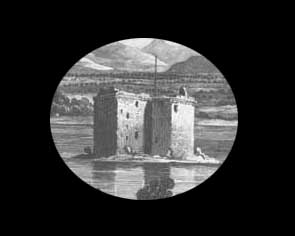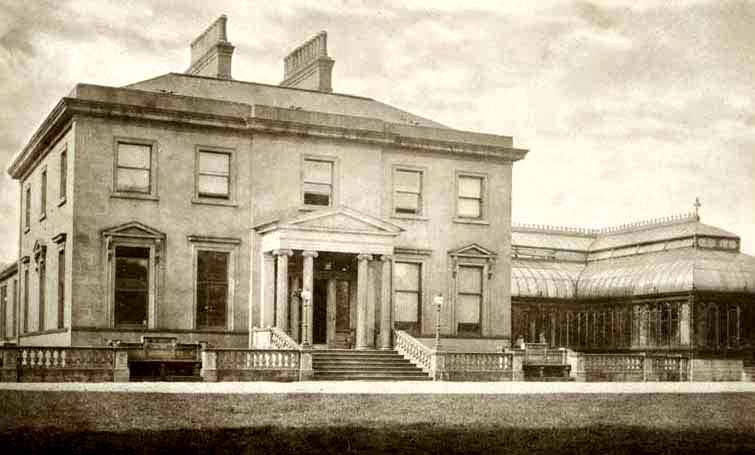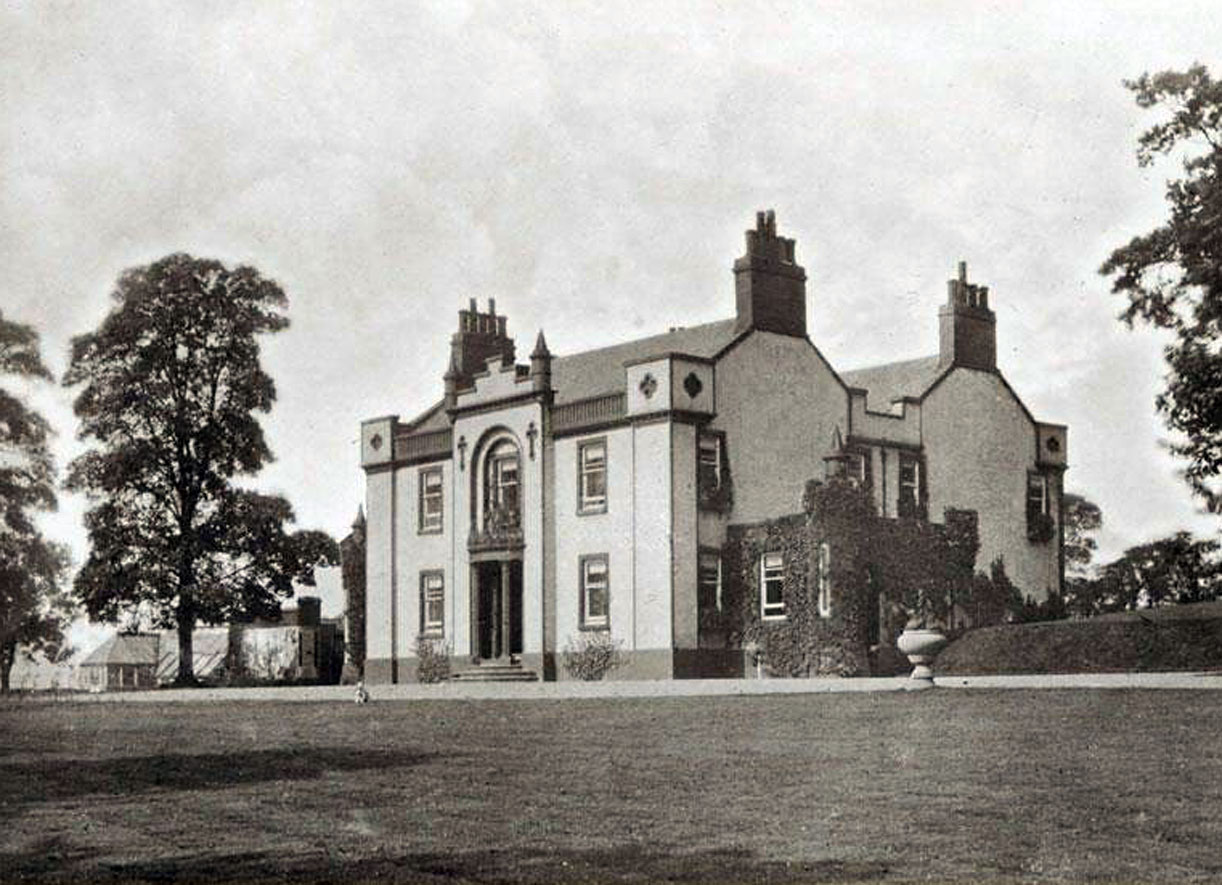
Photograph by
Thomas Annan
Ferguslie House was best
known as the home of Mr Thomas Coats of the
well-known firm of J and P Coats, thread
manufacturers in Paisley. It was built in 1828 by Hippolyte J Blanc
with additions by Abercrombie of Paisley,
converted into a hospital in 1916 and demolished
in 1920. In 1845, it was recorded that the remains of a castle
were also on the site, the land having been
granted in 1544 by the Abbot of Paisley to a man
called John Hamilton. The house was situated
across the main road from the giant Ferguslie Mills complex behind the pond in the
park which is still there today..
The aerial photo below
shows how close it was to the mills. It is the
white building in the top middle above the pond
that is still there now.

This postcard shows the ornamental pond in the
gardens of Ferguslie House as it was in the very
early years of the twentieth century. A bridge
connects the island to the banks and these have
been extensively Iandscaped with trees and
flower beds.
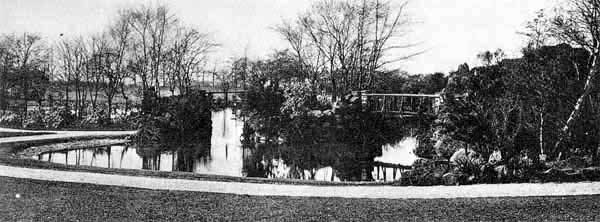
The former stables to
Ferguslie House on the main road have now been
converted and divided into flats.
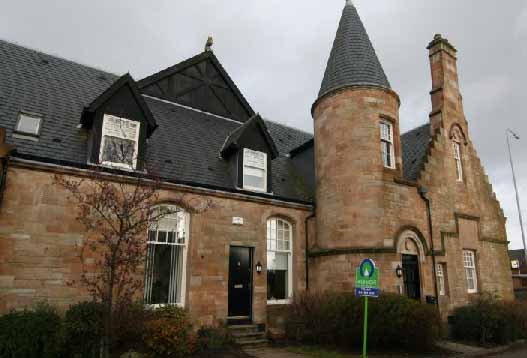
Here is some background on the Coats family.
Sir Peter Coats
and Thomas Coats
Members of Paisley's famous Coats family, Peter
and Thomas took over the running of their
father's Ferguslie threadworks, J and P Coats, in
the 1830s. Under their leadership, the company
became one of the world's leading thread
manufacturers.
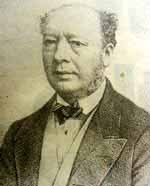 Thomas Coats (1809 - 1883),
unlike Peter, had intended to work in the family
firm and had been apprenticed to McDowall, the
Johnstone engineering firm, to give him a good
technical training. It also gave him a good
grounding in the practical aspects of textile
machinery. He and his wife moved into Ferguslie
House in 1845 and brought up their 11 children
there. His death in 1883 was marked by a public
funeral with 2,000 people following his coffin. Thomas Coats (1809 - 1883),
unlike Peter, had intended to work in the family
firm and had been apprenticed to McDowall, the
Johnstone engineering firm, to give him a good
technical training. It also gave him a good
grounding in the practical aspects of textile
machinery. He and his wife moved into Ferguslie
House in 1845 and brought up their 11 children
there. His death in 1883 was marked by a public
funeral with 2,000 people following his coffin.
Peter, and his brother Thomas, were largely
responsible for the rapid expansion of J and P
Coats during the 19th Century. As sales in
America increased during the late 1840s, the
capacity of the Ferguslie Mills doubled, and then
doubled again in the 1850s.
The Coats family and public life
The family were major
benefactors. Thomas Coats best known gifts to
Paisley were the Observatory and the Fountain
Gardens. He was a supporter of many local
societies and charities and was deeply involved
in education. He became the first chairman of the
education board in 1873 and remained in that
position until his death. After his death the
Thomas Coats Memorial Church was built by his
family in his memory.
Peter Coats also played a large part in the life
of Paisley. He was the director of Paisley
Infirmary, Paisley Philosophical Institution and
the Government School of Design, among others. He
is probably best remembered for his gift of the
free library and museum to the town. With this
gift, Paisley became only the third place in
Scotland to have a library and museum run by the
local council. Peter was later knighted by Queen
Victoria for this particular piece of generosity.
From Ramsay Philip (1839) Views in
Renfrewshire, with historical and descriptive
notices,
T H E mansion house of Ferguslie is pleasantly
situated on a rising ground, a short distance
west of Paisley, and south of the line of the
Glasgow and South-Western railway and is
surrounded by a beautiful and well-wooded park.
The greenhouses. -which are extensive, are
profusely furnished with rare and valuable
plants. A glance at e picture «-ill shew that
the style of the house is unique, and the
decoration original. is memorable as having been
the residence, for nearly half-a-century, of the
late Mr. Thomas Coats, one of the partners of the
well-known firm of J. & P. Coats, Thread
manufacturers in Paisley. He was born in Paisley
in 18o9, and acquired, in 1845, the portion of
Ferguslie on which the house stands ; and in 1872
he acquired the remainder, which lies to the
north of the railway, and on which his son,
Lieut.-Colonel Thomas Glen Coats, is presently
erecting a palatial residence in the Scottish
Baronial style, called Ferguslie Park.
The late Mr. Coats was a liberal benefactor to
his native town,-having led to it the Fountain
Gardens and the Observatory, both amply endowed ;
and also given considerable sums to improve the
accommodation of the Schools erected by the
school Board, of which he was chairman from its
formation till his death, which took place 15th
October, 1883. The high esteem in which Mr.
Coats' memory is cherished is out to be
perpetuated by the erection of a statue of him,
for which funds have been generally subscribed by
all classes of the community. The mansion will
ever be associated th the Ferguslie Collection of
Scottish Coins, which was gathered together by
Mr. Coats the course of many years, and is
regarded as the finest and most complete now in
persistence.
The estate of Ferguslie formed a portion of the
extensive possessions of the Abbey of Paisley in
pre-Reformation times. According to the Registrum
Monasterii de Passelet, it s granted, in 1544, by
John Hamilton, Abbot of Paisley, to John
Hamilton, a scion of ~ Hamiltons of Orbiston; but
from an entry in the Register of the Great Seal,
it appears a John Hamilton was only tenant in
Ferguslie in i547, and had not become proprietor
til 1551. His wife, Janet Livingstone, died at
Ferguslie in September, 1552; and he s living
four years after that date. Margaret,
grand-daughter of Hamilton of Ferguslie, s
married, about 1609, to John Wallace, son of
William Wallace of Elderslie, and Chamberlain to
James, Earl of Abercorn.
Her brother, the Laird of Ferguslie, died
married, and left the estate to his sister, on
condition that she and her heir should take !
name of Hamilton; and she was known as the
guidwife of Ferguslie. Under this ne she became
the object of Presbyterian persecution, and the
dealings of the Presbetary of Paisley with her
for non-attendance on public worship are very
fully detailed the Records. As illustrating the
character of the time, some of the details may be
quoted. The story is more fully related in
Dobie's Cunninghame, P. 209 :" June 8th,
i643.-The guidwife of Ferguslie having been
repeatedly summoned forattending worship in her
Parish Church of Paisley, and her husband
reporting that he could not for want of health,
the Presbytery ordain the minister to go to
Ferguslie,, in presence of the guidwife, read and
expound the Scriptures and sing Psalms. He
regrets his having done so; they appoint him to
examine her upon oath, whether it be guility of
body or scruples of conscience which prevent her
attendance.
|
